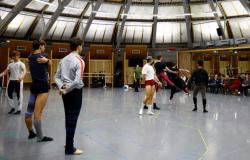It is 4:42 a.m. this Friday, October 5, 1962. Since Thursday afternoon, the National Assembly has been passionately debating the motion of censure tabled against the government of Georges Pompidou. “Conspiracy”, “forfeiture”, “conjuration”, the most violent words were exchanged over the hours. The vote arrives, in the middle of the night. Then it’s time to count the votes. “Majority required for the adoption of the motion of censure: 241, recalls the Gaullist Jacques Chaban-Delmas, who chairs the session. For adoption: 280. The motion of censure is adopted. »
Never have these words resonated in the Hemicycle since the establishment of the Ve Republic. They were never heard from again. Since 1958, nearly 150 motions of censure have been tabled. But only one achieved its goal, that of October 1962. While waiting, perhaps, for the motion which will be debated, Wednesday November 4, to bring down the government of Michel Barnier.
Read also | Article reserved for our subscribers The story of a day of change in the National Assembly: from 49.3 decided by Michel Barnier to the filing of two motions of censure
Read later
The history of the only censorship adopted in more than sixty-five years is that of a fleeting success, which very quickly turns into implacable failure for its initiators. It all began on August 22, 1962, on a suburban road. In Clamart (Hauts-de-Seine), the car which took Charles de Gaulle to Villacoublay airport (Yvelines) with his wife and son-in-law suddenly found itself machine-gunned by several shooters. Some 150 bullets flew towards the President of the Republic. No one is affected. This failed attack instigated by a defender of French Algeria nevertheless accelerated General de Gaulle's projects.
“Extravagant” and “dangerous”
To strengthen the political regime that he established four years earlier, and whose fragility this assassination attempt demonstrates in his eyes, the former resistance fighter announced, on September 20, a reform of the Constitution. He proposed that the President of the Republic should henceforth be elected no longer by a college of electors, but by direct universal suffrage, and he decided to submit this modification to the approval of all French people by referendum.
Outcry among parliamentarians, who feel bypassed, especially since many lawyers contest the procedure followed. Elected officials, above all, refuse such a strengthening of the electoral base of the President of the Republic, and therefore of his power, which suddenly modifies the balance of institutions. On October 4, radical, independent, socialist and Christian-democrat deputies tabled a joint motion of censure.
You have 50.33% of this article left to read. The rest is reserved for subscribers.







